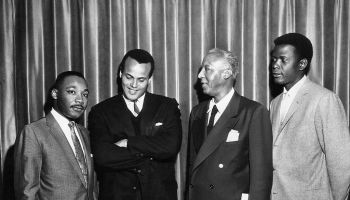Edward Snowden might be hiding, but he’s not invisible.
Yesterday the NSA whistleblower (read hero to some, traitor to others), decided to break his silence and provide The Guardian UK an exclusive interview where he answered questions from readers.
The 29-year-old former NSA contractor talked about why he revealed the NSA’s top-secret surveillance of US citizens, the international storm that has ensued, and the uncertain future he now faces.
If you recall, Snowden was the man behind the security leak that exposed the National Security Agency programs that watch Americans in what Snowden believes is an un-American way.
The interview comes as U.S. leaders are deciding whether to prosecute Snowden for the leak. But he seems unconcerned about that.
“All I can say right now is the U.S. government is not going to be able to cover this up by jailing or murdering me,” Snowden said. “Truth is coming, and it cannot be stopped.”
Here are some of the questions and answers from yesterday’s Q&A.
– Why did you choose Hong Kong to go to and then tell them about US hacking on their research facilities and universities?
First, the US Government, just as they did with other whistleblowers, immediately and predictably destroyed any possibility of a fair trial at home, openly declaring me guilty of treason and that the disclosure of secret, criminal, and even unconstitutional acts is an unforgivable crime. That’s not justice, and it would be foolish to volunteer yourself to it if you can do more good outside of prison than in it.
– Why did you wait to release the documents if you said you wanted to tell the world about the NSA programs since before Obama became president?
Obama’s campaign promises and election gave me faith that he would lead us toward fixing the problems he outlined in his quest for votes. Many Americans felt similarly. Unfortunately, shortly after assuming power, he closed the door on investigating systemic violations of law, deepened and expanded several abusive programs, and refused to spend the political capital to end the kind of human rights violations like we see in Guantanamo, where men still sit without charge.
– When you say “someone at NSA still has the content of your communications” – what do you mean? Do you mean they have a record of it, or the actual content?
Both. If I target for example an email address, for example under FAA 702, and that email address sent something to you, Joe America, the analyst gets it. All of it. IPs, raw data, content, headers, attachments, everything. And it gets saved for a very long time – and can be extended further with waivers rather than warrants.
– What are your thoughts on Google’s and Facebook’s denials? Do you think that they’re honestly in the dark about PRISM, or do you think they’re compelled to lie?
Their denials went through several revisions as it become more and more clear they were misleading and included identical, specific language across companies. As a result of these disclosures and the clout of these companies, we’re finally beginning to see more transparency and better details about these programs for the first time since their inception.
They are legally compelled to comply and maintain their silence in regard to specifics of the program, but that does not comply them from ethical obligation. If for example Facebook, Google, Microsoft, and Apple refused to provide this cooperation with the Intelligence Community, what do you think the government would do? Shut them down?
Check out the rest of the question and answer session, here.
SOURCE: Guardian
















